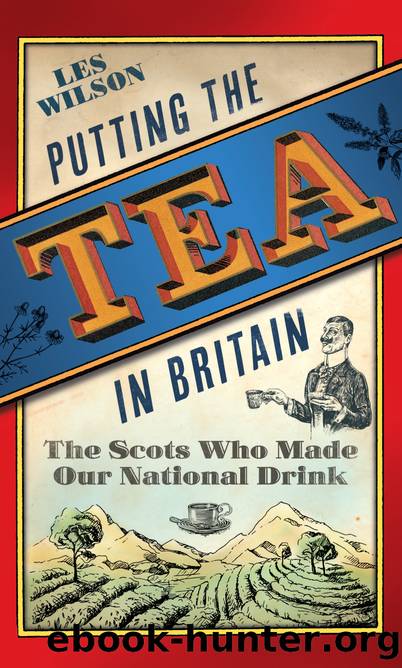Putting the Tea in Britain by Les Wilson

Author:Les Wilson
Language: eng
Format: epub
Publisher: Birlinn Limited
Archibald Campbell was born on the Inner Hebridean island of Islay in 1805, the sixth of eleven children raised by parents Archibald and Helen. Archibald senior was the tacksman of Ardmore in the parish of Kildalton, on the ragged easterly coast. A tacksman was a âsub-lairdâ, a gentleman who leased a large area of a landownerâs estate and sublet parcels of it to lesser tenants, and Campbell was significant enough to serve on, and in 1814 preside over, Islayâs Stent Committee, a local âparliamentâ of gentlemen who imposed taxes (or âstentsâ) on the islanders for various public works.
Close to what was the Campbell home at Ardmore stands Islayâs famous Kildalton Cross, an eighth-century carved Celtic masterpiece, and the ruins of the medieval parish church, beside which the graves of Campbells of Ardmore can still be seen, although the kirk where Archibald Campbell of Darjeeling was baptised was in nearby Lagavulin. The register of births for the parish suggests that Archibald and Helen Campbell waited until 1821 to have their eleven children baptised, all on the same day. Back then parish ministers were occasionally sloppy in their record-keeping and sometimes had to play âcatch-upâ, but, more commonly, a mass christening would take place after a minister convinced the erring parents of a family of unbaptised children to remedy the situation.1
Lagavulin was an important community, boasting merchants and a distillery (legal since 1816) that produces a distinctive, complex and smoky whisky to this day. Gentlemen farmers there spent âalmost the whole of their time rearing good black cattleâ. Cattle, horses and linen yarn were shipped out of the parish, and meal, salt, sugar and tea were among the goods probably landed at Lagavulin.2
Campbell of Ardmore had an heir (John, born in 1801) and a spare (William, born in 1803), so young Archibald would have to make his own way in the world. In this era Islay was haemorrhaging people, especially young men. Many went to the Lowlands for work, while others left for America and other foreign climes, but when young Archibald left Islay it was to study at Glasgow and then Edinburgh universities. The Old Statistical Account shows that there were two schools in Kildalton Parish at the beginning of the nineteenth century and it was one of these that gave Archibald the grounding that he needed to flourish. Although Campbell was of âthe better sortâ of islander, he would have been a fluent Gaelic speaker and may well have dreamed of a cupa tì air a deagh-tharraing (a well-brewed cup of tea) on his arduous Indian journeys. Edinburgh Universityâs records show that he graduated in medicine in 1827; his thesis (written in Latin) had been on De Cynanche Tracheali â spasmodic laryngitis, or croup, a condition seen mainly in children. Later that year Campbell joined the East India Company as an assistant surgeon. Archibaldâs father â no doubt pleased to see his third son gainfully employed â may well have echoed the words of Sir Walter Scott, who wrote around
Download
This site does not store any files on its server. We only index and link to content provided by other sites. Please contact the content providers to delete copyright contents if any and email us, we'll remove relevant links or contents immediately.
The Theory, Practice, and Interpretation of Customary International Law by Panos Merkouris Jörg Kammerhofer Noora Arajärvi(215)
An Inquiry into the Nature of Peace and the Terms of Its Perpetuation by Thorstein Veblen(208)
The Trial of Pierre Laval by J. Kenneth Brody(207)
Rethinking Nordic Courts by Laura Ervo; Pia Letto-Vanamo; Anna Nylund(197)
Uncertain Justice: A Legal Thriller by K. Ryan Kerry(191)
Transnational Crime and Criminal Justice by Marinella Marmo Nerida Chazal(190)
Underwater Cultural Heritage and International Law by Sarah Dromgoole(189)
HPCR Manual on International Law Applicable to Air and Missile Warfare by Program on Humanitarian Policy and Conflict Research at Harvard University(187)
Putting the Tea in Britain by Les Wilson(185)
International Criminal Law in a Nutshell by Stewart David P.;(185)
The Medallion by Alan P. Woodruff(185)
A Farewell to Wars: The Growing Restraints on the Interstate Use of Force by Hans Blix(183)
Law Beyond the State by Carmen E. Pavel(182)
Otto, Roland - Targeted Killings and International Law With Special Regard to Human Rights and International Humanitarian Law by Springer (2009)(174)
The Despot's Guide to Wealth Management: On the International Campaign Against Grand Corruption by J. C. Sharman(171)
Trafficking Justice : How Russian Police Enforce New Laws, from Crime to Courtroom by Lauren A. McCarthy(169)
The Rhetoric of Genocide by Ben Voth(168)
The Limits of International Law by Jack L. Goldsmith & Eric A. Posner(166)
The Law of Non-International Armed Conflict by Sivakumaran Sandesh;(150)
